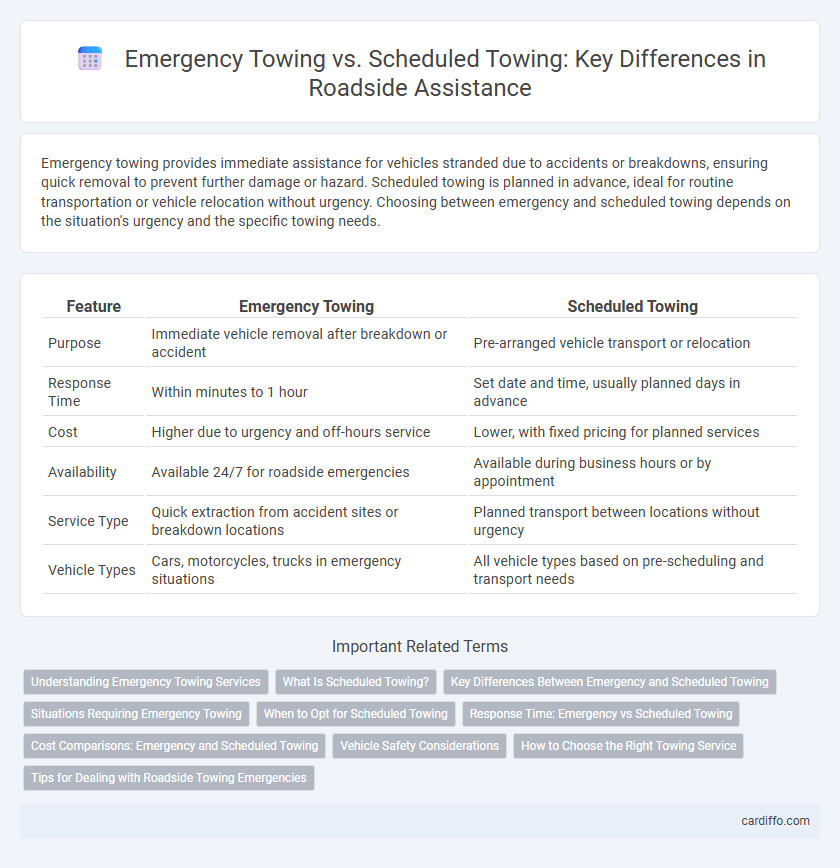Emergency towing provides immediate assistance for vehicles stranded due to accidents or breakdowns, ensuring quick removal to prevent further damage or hazard. Scheduled towing is planned in advance, ideal for routine transportation or vehicle relocation without urgency. Choosing between emergency and scheduled towing depends on the situation's urgency and the specific towing needs.
Table of Comparison
| Feature | Emergency Towing | Scheduled Towing |
|---|---|---|
| Purpose | Immediate vehicle removal after breakdown or accident | Pre-arranged vehicle transport or relocation |
| Response Time | Within minutes to 1 hour | Set date and time, usually planned days in advance |
| Cost | Higher due to urgency and off-hours service | Lower, with fixed pricing for planned services |
| Availability | Available 24/7 for roadside emergencies | Available during business hours or by appointment |
| Service Type | Quick extraction from accident sites or breakdown locations | Planned transport between locations without urgency |
| Vehicle Types | Cars, motorcycles, trucks in emergency situations | All vehicle types based on pre-scheduling and transport needs |
Understanding Emergency Towing Services
Emergency towing services provide immediate assistance for vehicles involved in accidents, breakdowns, or hazardous situations, ensuring rapid removal to prevent further damage or traffic disruptions. These services prioritize timely response and safety, often operating 24/7 to address urgent roadside incidents. Understanding emergency towing involves recognizing the critical difference from scheduled towing, which is prearranged for non-urgent vehicle transport.
What Is Scheduled Towing?
Scheduled towing refers to pre-arranged towing services planned in advance, often for vehicle transport or maintenance purposes. This type of towing ensures that a tow truck arrives at a specified time and location, minimizing wait times and allowing for efficient coordination. Unlike emergency towing, scheduled towing typically involves non-urgent situations such as moving a vehicle between locations or transporting it to a repair shop.
Key Differences Between Emergency and Scheduled Towing
Emergency towing prioritizes rapid response and immediate assistance for vehicles involved in accidents, breakdowns, or hazardous situations on busy roads. Scheduled towing involves pre-arranged, non-urgent vehicle transport, typically used for maintenance, relocation, or routine service without time constraints. Key differences include response time, urgency, and the specific circumstances prompting the tow, with emergency towing addressing critical roadside incidents and scheduled towing planned in advance.
Situations Requiring Emergency Towing
Emergency towing is essential during sudden vehicle breakdowns, accidents, or hazardous roadside conditions where immediate removal is critical for safety and traffic flow. Scheduled towing is ideal for non-urgent situations such as planned vehicle relocations or maintenance transport, offering flexibility and convenience. Situations requiring emergency towing often involve immobilized vehicles blocking traffic or posing collision risks, necessitating rapid response from professional tow operators.
When to Opt for Scheduled Towing
Scheduled towing is ideal when vehicle transport can be planned in advance, such as during long-distance moves, classic car deliveries, or non-urgent repairs. Choosing scheduled towing ensures availability, reduces costs, and allows the towing company to allocate the appropriate equipment for specialized vehicles. It is best suited for situations where timing can be coordinated rather than for sudden road emergencies.
Response Time: Emergency vs Scheduled Towing
Emergency towing prioritizes rapid response times, often arriving within 30 minutes to ensure immediate vehicle recovery during breakdowns or accidents. Scheduled towing services operate on pre-arranged times, typically offering longer response windows ranging from several hours to a day, suitable for non-urgent vehicle relocations. Faster arrival in emergency towing minimizes roadside hazards and reduces driver stress compared to the planned timing of scheduled towing.
Cost Comparisons: Emergency and Scheduled Towing
Emergency towing services typically cost significantly more than scheduled towing due to the urgency, after-hours timing, and immediate response required. Scheduled towing allows for better planning and can reduce expenses by avoiding peak demand rates and enabling service providers to optimize routes. Comparing both, emergency towing can be two to three times more expensive than scheduled towing, emphasizing cost efficiency in non-urgent scenarios.
Vehicle Safety Considerations
Emergency towing prioritizes immediate vehicle safety by preventing further damage during unexpected breakdowns, with specialized equipment designed to handle urgent situations. Scheduled towing allows for thorough vehicle assessment and preparation, reducing risks associated with improper loading or transport. Choosing the appropriate towing method ensures optimal protection for the vehicle's mechanical and structural integrity.
How to Choose the Right Towing Service
Choosing the right towing service depends on the urgency and nature of the situation, with emergency towing offering immediate assistance for breakdowns or accidents, while scheduled towing caters to planned vehicle relocations or maintenance needs. Key factors to evaluate include response time, availability, and the specific towing equipment required to safely handle different vehicle types. Prioritizing licensed providers with clear pricing policies ensures reliable service and prevents unexpected costs during roadside emergencies or scheduled transfers.
Tips for Dealing with Roadside Towing Emergencies
In roadside towing emergencies, prioritize contacting a reliable emergency towing service with 24/7 availability and quick response times to ensure safety and minimize vehicle damage. Keep essential information ready, such as location details, vehicle type, and insurance data, to expedite the towing process efficiently. Avoid attempting to move or fix the vehicle yourself, as professional emergency towing teams are equipped to handle hazards and protect vehicle integrity during urgent roadside situations.
Emergency Towing vs Scheduled Towing Infographic

 cardiffo.com
cardiffo.com